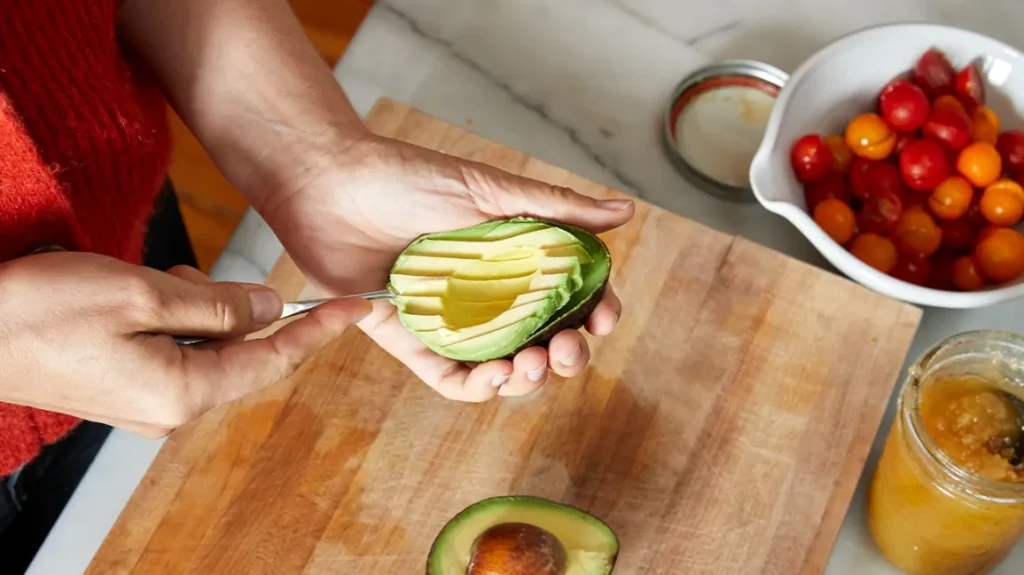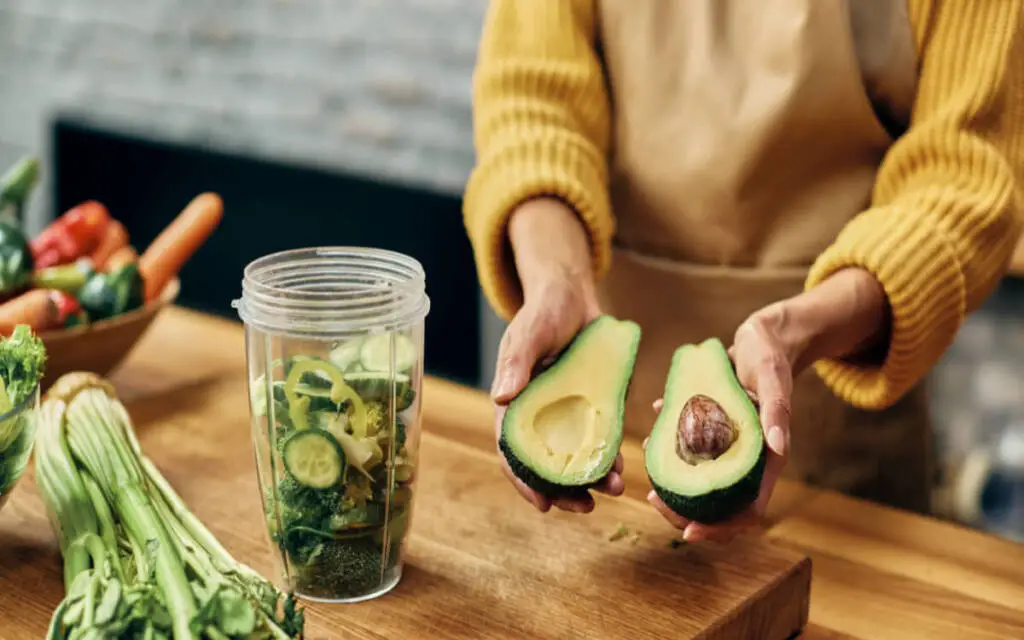Do you find yourself feeling drowsy after indulging in a delicious bowl of guacamole or avocado toast?
You’re not alone. Many people have reported feeling sleepy after consuming this trendy superfood. But is there any scientific evidence to back up this claim?
In this article, we’ll explore the nutritional benefits of avocado and the link between food and sleepiness.
We’ll also delve into the compounds found in avocado that may induce sleep, such as tryptophan and melatonin.
Finally, we’ll take a look at some studies conducted on the relationship between avocado consumption and sleep quality.
So, if you’ve ever wondered whether your love for avocados is causing you to feel tired, keep reading to find out more!
Key Takeaways
- Avocado contains tryptophan and melatonin, which can aid in inducing sleep and lead to greater melatonin production.
- The healthy fats found in avocados may promote relaxation and reduce stress levels, leading to better sleep quality and quantity.
- Avocado consumption at dinnertime has been linked to improved sleep latency.
- It’s important to pay attention to what we eat and how it affects our body’s ability to rest properly, as caffeine, sugar, and alcohol can all negatively impact sleep.
Nutritional Benefits of Avocado
You’ll be happy to know that avocados are not only delicious, but they’re also packed with nutrients like healthy fats, fiber, and potassium that can do wonders for your body.
The health benefits of avocado go beyond just being a tasty addition to your diet.
These superfoods have been known to help reduce inflammation in the body, lower cholesterol levels, and even aid in weight loss.

One of the best things about avocados is how versatile they are when it comes to cooking.
You can slice them up and add them to salads or sandwiches, mash them into guacamole for a snack or dip, or use them as a substitute for butter or mayo in recipes.
Avocado oil is also a healthier option for cooking at high temperatures because it has a higher smoke point than other oils.
| Nutrient | Amount per 100g |
|---|---|
| Calories | 160 |
| Total Fat | 14.7g |
| Saturated Fat | 2.1g |
| Monounsaturated Fat | 9.8g |
| Polyunsaturated Fat | 1.8g |
| Carbohydrates | 8.5g |
| Fiber | 6.7g |
| Protein | 2g |
| Vitamin K | 21μg |
| Vitamin C | 10mg |
| Vitamin E | 2.1mg |
| Potassium | 485mg |
| Folate | 81μg |
| Magnesium | 29mg |
| Iron | 0.6mg |
If you’re looking to incorporate more avocados into your diet, start by adding them to your meals as a side dish or topping.
And don’t forget about the seed! Although often discarded, the seed of an avocado can be ground up and used as a spice or seasoning for dishes like soups and stews.
So next time you enjoy an avocado meal, remember all the amazing health benefits it provides!
The Link Between Food and Sleepiness
Eating certain foods before bedtime can affect your ability to fall asleep and the quality of your sleep.
Your food choices play a crucial role in regulating your circadian rhythm, which is the internal biological clock that controls when you feel awake or sleepy.

Certain foods can help promote sleep, while others can keep you up at night.
Here are four factors affecting sleepiness that you should consider:
- Caffeine: Consuming caffeinated beverages like coffee or tea at night can make it difficult for you to fall asleep.
- Sugar: Eating sugary snacks before bed can lead to a spike in blood sugar levels, causing restlessness and interfering with deep sleep.
- Alcohol: Though it may initially make you feel drowsy, alcohol disrupts the natural sleep cycle and reduces the overall quality of your slumber.
- Heavy meals: Having a large meal close to bedtime puts extra strain on your digestive system, making it harder for you to relax and fall asleep.
It’s important to pay attention to what you eat and how it affects your body’s ability to rest properly. So if you want a good night’s sleep, be mindful of what goes into your body before bedtime!
Tryptophan and Melatonin: Sleep-Inducing Compounds in Avocado
Consuming foods that contain tryptophan and melatonin, such as avocado, can aid in inducing sleep.
Tryptophan is an amino acid that helps create serotonin, a neurotransmitter that regulates mood and sleep.
On the other hand, melatonin is a hormone released at night by the pineal gland that signals the body to prepare for sleep.
Avocado is an excellent source of both tryptophan and melatonin. In fact, it contains even more of these compounds than other popular sleep-inducing foods like turkey or milk.
Incorporating avocado into your dinner or snack can help you relax and fall asleep faster.
To make the most out of avocado’s sleep-inducing properties, try incorporating it into your relaxation techniques.
Avocado recipes like guacamole or avocado toast are easy to make and can be enjoyed while practicing meditation or deep breathing exercises before bedtime.
So next time you’re struggling with insomnia, reach for an avocado instead of sleeping pills!
Studies on Avocado and Sleep
If you’re struggling to get a good night’s rest, it’s worth noting that studies have shown avocado may improve the quality and duration of your sleep.

Here are 4 interesting findings regarding avocado and sleep:
- In one study, researchers found that consuming two medium-sized Hass avocados daily for six weeks led to improvements in both sleep quality and quantity among participants with insomnia.
- Another study showed that eating avocado at dinner time improved sleep latency (the amount of time it takes to fall asleep) and reduced waking up during the night.
- Avocado consumption has also been linked to greater melatonin production, which is a hormone responsible for regulating our circadian rhythm.
- Additionally, the healthy fats found in avocados may help promote relaxation and reduce stress levels, both of which can contribute to better sleep.
So if you’re looking for a natural way to improve your sleeping habits, consider incorporating more avocado into your diet.
Whether sliced on toast or blended into a smoothie, this tasty fruit just might be what you need for a more restful night’s sleep.
Frequently Asked Questions
How many avocados should I eat to help me sleep better?
To improve sleep quality, experiment with different avocado dosages until you find the sweet spot for your body. Other foods, like bananas and almonds, also promote better sleep and can be used as alternatives.
Can eating avocado at night cause indigestion or stomach discomfort?
Eating avocado at night may cause indigestion or stomach discomfort. However, it can also help with sleep due to its effectiveness as a sleep aid. Pay attention to your body’s reaction and adjust your intake accordingly for optimal avocado digestion.
Does the type of avocado (Hass, Fuerte, etc.) affect its sleep-inducing properties?
The type of avocado you choose (Hass vs. Fuerte) may affect its taste and nutritional value, but it doesn’t impact its sleep-inducing properties. Seasonal availability and organic vs. conventional options also don’t affect sleep benefits.
Can avocado be consumed in other forms, such as smoothies or salads, to promote better sleep?
Looking for Avocado alternatives to improve your sleep? Try adding avocado to smoothies or salads! There are plenty of recipes with avocado that can help promote better sleep without the need for eating it by itself.
Are there any potential negative side effects of regularly consuming avocado for its sleep benefits?
Regular avocado consumption for sleep may have potential risks and long term effects, such as weight gain or high potassium levels. Consider trying other foods for better sleep, like cherries or almonds.
Amazon and the Amazon logo are trademarks of Amazon.com, Inc, or its affiliates.

